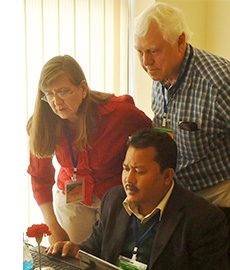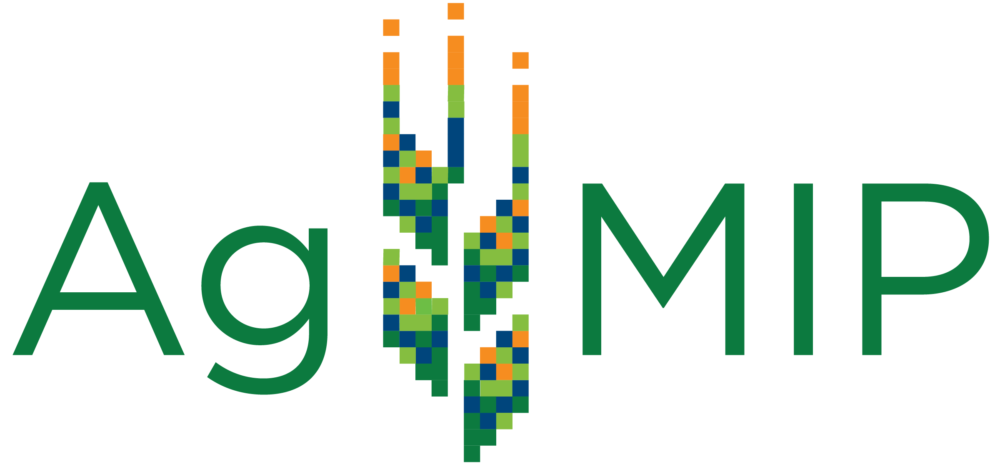In order to assess future impacts of climate change on regional food security, AgMIP teams of researchers are working in Sub-Saharan Africa and South Asia utilizing protocoled AgMIP methods to execute regional integrated assessments of crop productivity and related outcomes. The approach includes use of multiple crop models and linking them with climate and economic models to create the integrated assessments. To assist researchers in utilizing this approach, two training workshops focusing on multiple crop modeling and one on economic modeling were recently held.
Crop modeling is an important tool in the effort to anticipate possible shifts in crop productivity in the face of climate and other changes. However, even well calibrated crop models are still just an approximation of a real system, and it is not always clear how much confidence to place in model outputs.
 Recent studies by AgMIP researchers demonstrate that results of multiple crop models give more reliable results than any single model. Results from more than one model can also shed light on differences from one model to another, providing researchers insights as to how estimates of soil moisture, root depth, or other aspects of crop development may affect model results.
Recent studies by AgMIP researchers demonstrate that results of multiple crop models give more reliable results than any single model. Results from more than one model can also shed light on differences from one model to another, providing researchers insights as to how estimates of soil moisture, root depth, or other aspects of crop development may affect model results.
To facilitate the use of multiple crop models by AgMIP teams, the multiple model training workshops were held in March in Nepal and ICRISAT’s Andhra Pradesh campus with the support of ICRISAT/CCAFS, DFID/UKaid, and CIMMYT/CSISA. Over 50 participants were trained in Decision Support System for Agrotechnology Transfer (DSSAT) or Agricultural Production Systems Simulator (APSIM) methods and AgMIP tools. Additionally, experienced crop modelers were trained as trainers capable of providing instruction and guidance to other researchers. Several of the instructional presentations are viewable thanks to video recording by AgMIP’s South Asia Regional Coordination Team at ICRISAT.
Participants at the crop modeling workshops were expected to have crop modeling experience in one model, with the goal of receiving training on an alternate model, as well as how that new model performed in their own local experiment and farm survey situations. They also learned to reliably calibrate multiple crop models and complete crop model simulations needed by economists for use in the TOA-MD economic model.
The principal trainers in DSSAT were Ken Boote (University of Florida) and Gerrit Hoogenboom (Washington State University), with assistance from G. Baigorria (U Nebraska), D. MacCarthy (University of Ghana), D. Kadiyala (ANGR Agricultural University), D. Fatondji (ICRISAT), J. Hargreaves (CSIRO) led the APSIM training, with assistance from N. Subash (ICAR), B. Singh (IRRI), P. Masakati (ICRISAT-ZIM) and N. Rao Vajja.(ICRISAT). Cheryl Porter (University of Florida) trained participants in AgMIP Tools.
A third AgMIP-sponsored training workshop, this time on regional economic modeling and impact assessment using the Tradeoff Analysis – Minimum Data (TOA-MD) model, was held in Dubai in late May with the support of ICRISAT/CCAFS and DFID/UKaid, and organized by the AgMIP Regional Economics Team of John Antle and Roberto Valdivia at Oregon State University. The economists attending this workshop used some of the multiple crop modeling data from the two previous workshops in their TOA-MD models.
The goal of Tradeoff Analysis is to support informed policy decision making. TOA-MD is a novel modeling approach to simulate agricultural technology adoption and to assess technology impacts, ecosystem service supply, and impacts of environmental change (including climate change). More information about TOA-MD is available at tradeoffs.oregonstate.edu. The goal of the workshop was to review and build on the fast-track analysis to implement a complete climate impact assessment and technology adaptation analysis for at least one regional case study.
The attendees of the crop model training workshops were required to bring data from AgMIP sentinel site experiments as well as from local farm surveys. Sentinel site data includes weather, soil water holding traits, sowing dates, fertilizer, irrigation, and crop yield. The farm survey data includes weather, soil, farm management, and crop yield.
“The multiple crop modeling workshops were a very important step for the teams to accomplish to facilitate the fast track assessments of the crop models,” Ken Boote commented. “We also learned what AgMIP tools worked and what we needed to improve.”
Now that all three workshops have been completed, AgMIP will build on the learning gained at the upcoming mid-term workshops in July for the South Asia and Sub-Saharan Africa teams. These workshops will continue the work of implementing complete integrated assessments and adaptation analysis of the impacts of climate change on regional agriculture.
